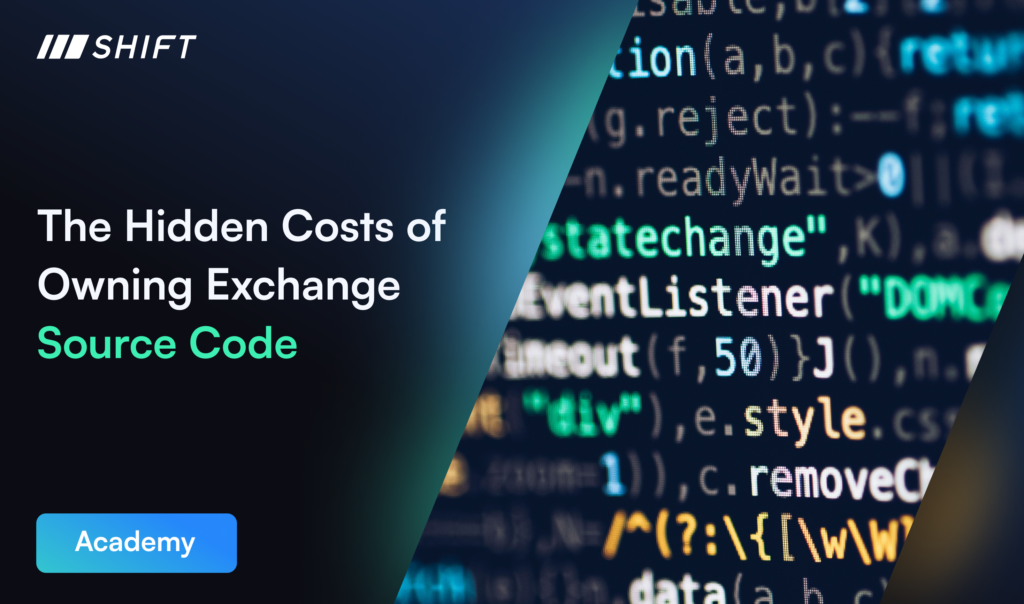Summarize with AI:
The Hidden Costs of Owning Exchange Source Code
Key Takeaways:
-
Owning source code requires constant updates, increasing security risks, regulatory burdens, and maintenance costs
-
A licensed platform ensures ongoing security, compliance, and performance enhancements without the technical burden.
-
Pre-built infrastructure reduces expenses, accelerates market entry, and ensures seamless liquidity access
In the world of automated trading, infrastructure decisions determine an exchange’s long-term success. Owning source code might seem appealing, but the reality is more complicated. Smart order routing (SOR), liquidity aggregation, and execution algorithms evolve constantly, and maintaining proprietary code requires continuous updates.
Shift Markets does not sell its platform’s source code—and for good reason. Trading venues and financial technology platforms require real-time performance optimizations, security patches, and regulatory compliance. Without ongoing upgrades, source code becomes a liability, increasing transaction costs and exposing the platform to security risks.
This article explores why buying source code from an exchange infrastructure provider isn’t the way in the long run and why a licensed, continuously updated platform is the smarter choice for order execution, trade optimization, and routing efficiency
The Pitfalls of Owning Exchange Source Code
While owning source code may seem like a path to greater control, the reality is far more challenging. Exchange operators must contend with security risks, performance limitations, and the ongoing financial and technical burden of maintaining and optimizing their infrastructure. Without continuous enhancements, trading platforms risk becoming obsolete, exposing operators to inefficiencies and competitive disadvantages.
Security & Compliance Risks
Trading platforms are prime targets for cyberattacks, requiring constant security updates to protect against evolving threats. Owning source code places the full burden of maintaining security patches, ensuring best execution compliance, and keeping up with regulatory changes on the exchange operator. Without continuous latency reduction strategies and security enhancements, outdated software quickly becomes a liability, increasing the risk of breaches and inefficiencies. Additionally, internal risks arise when employees responsible for maintaining the code inadvertently introduce vulnerabilities or expose critical order execution mechanisms to potential threats.
No Continuous Enhancements
The market access landscape evolves rapidly, making static software obsolete. Exchange operators who purchase source code are stuck with a fixed version, bearing the burden of upgrades and optimizations. Licensing from a provider ensures continuous trade optimization, price improvement, and seamless liquidity integrations.
Scalability & Performance Challenges
The market access landscape evolves rapidly, making it difficult for static software to keep up with changing demands. Exchange operators who purchase source code are locked into a fixed version, leaving them responsible for all future upgrades and optimizations. In contrast, licensing from a dedicated provider ensures continuous trade optimization, price improvement, and seamless integration with new liquidity sources, keeping the platform competitive and up to date.
The Risk of “Shared Source Code”
High-performance smart order routing (SOR) and automated trading strategies rely on low-latency execution, continuous speed improvements, aggregated liquidity access, and optimized order fulfillment. Owning the source code requires significant ongoing investment in these areas to maintain routing efficiency and uphold best execution standards, placing a heavy technical and financial burden on exchange operators.
The Burden of Ongoing Support
Crypto markets require real-time adjustments to smart order routing algorithms, market access requirements, trading platform liquidity integrations, and routing efficiency optimizations. Licensed solutions provide dedicated support and continuous financial technology innovations, whereas owning the code forces operators to manage all future upgrades independently, increasing operational complexity and risk.
Total Cost of Ownership (TCO)
The true cost of ownership extends far beyond the initial purchase price, encompassing the ongoing burden of maintaining execution algorithms, ensuring routing efficiency, managing regulatory compliance updates, optimizing order fulfillment and price improvement mechanisms, and investing in infrastructure scaling and latency reduction. These continuous demands make ownership a costly and resource-intensive commitment.
Why Shift Markets Provides a Better Alternative
Rather than struggling with the complexities of maintaining proprietary software, exchange operators can benefit from a licensed solution that ensures continuous innovation, security, and regulatory compliance. Shift Markets offers a scalable, high-performance trading platform designed for long-term success. Here’s why a licensed approach outperforms source code ownership:
Continuous Security & Compliance Updates
A dedicated security team continuously monitors vulnerabilities and regulatory changes, ensuring the platform remains protected and compliant. Smart order routing optimizations help maintain adherence to best execution requirements, while ongoing efficiency improvements keep the platform competitive in an ever-evolving trading landscape.
Built-in Smart Order Routing & Performance Optimization
Execution algorithms prioritize the most optimal trading venues, enhancing order fulfillment while aggregated liquidity access reduces spreads and improves market access. Automated trading optimizations further ensure fast execution and consistent price improvement.
Lower Operating Costs & Faster Time to Market
By leveraging a pre-built, continuously upgraded financial technology infrastructure, exchange operators eliminate the need for an in-house development team to manage and maintain the code. This approach enables faster exchange launches and provides predictable transaction costs, avoiding unexpected infrastructure expenses.
Future-Proofing with Scalable Trading Solutions
Regular platform enhancements keep exchanges ahead of market trends, with seamless integration into liquidity providers, financial technology tools, and execution speed optimizations. Additionally, machine learning-driven smart order routing adapts to market volatility, improving trade outcomes and overall platform efficiency.
Conclusion
Owning source code might seem like a shortcut to independence, but in reality, it introduces security risks, high maintenance costs, and execution inefficiencies. Instead of managing order fulfillment and routing optimizations alone, a licensed solution with built-in smart order routing ensures long-term success.
Shift Markets provides a scalable, continuously optimized trading platform with real-time liquidity aggregation and best execution capabilities. Want a future-proof trading platform? Talk to Shift Markets today.
Share this article:
Want to learn more?
Let us save you time by walking you through what Shift can do for your business!



